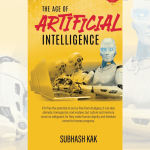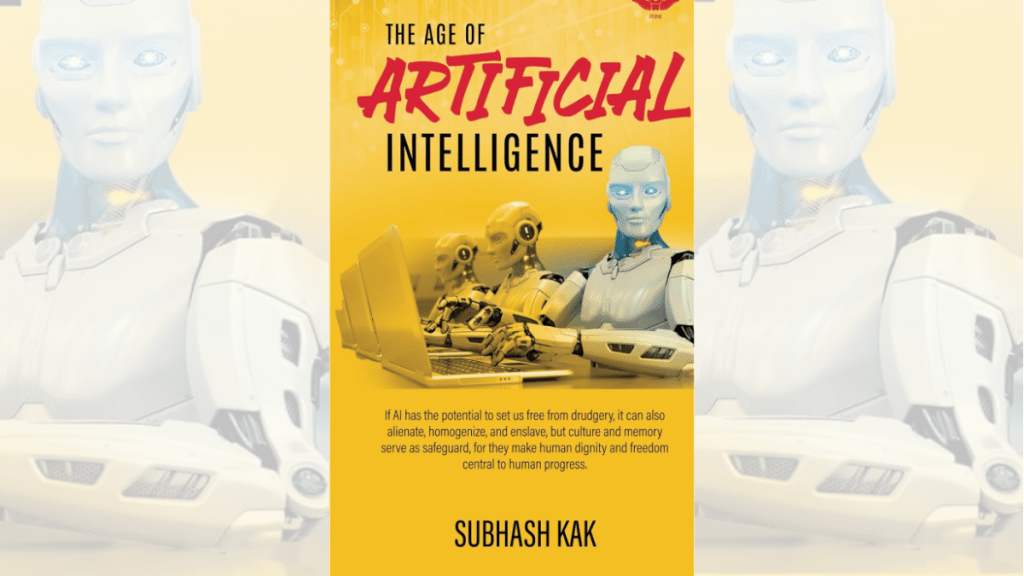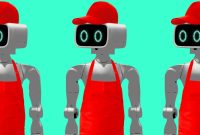

Estimated reading time:
6
minutes
An AI world
Each alteration presents fresh obstacles, and artificial intelligence (AI) is yet another such alteration. As mentioned in Subhash Kak’s book,
The Era of Artificial Intelligence
thoughtfully explores AI’s trajectory, blending technical insight with philosophical, historical, and cultural perspectives. Kak is a Regents Professor of Electrical and Computer Engineering at Oklahoma State University. An AI pioneer and an acclaimed Hindu philosopher, Kak also serves on the Prime Minister of India’s Science, Technology, and Innovation Advisory Council under Narendra Modi.
Early AI systems were expert systems designed for specific tasks, and robotics was their commonly understood application. In the early 1990s, I watched Stanley Kubrick’s acclaimed futuristic film
2001: A Space Odyssey
(1968) as part of my graduate class in Computational Linguistics at the University of Illinois at Urbana-Champaign. Natural language processing was critical in developing artificial intelligence. LISP and Prolog were two of the first programming languages I learned.
However, AI is now a much more complex system. All use AI, from natural language processing to speech/face recognition, AI customer service agents, and AI-assisted medical procedures. In 1968, Odyssey’s HAL 9000 computer had already let people know that it could “think” when it said, “I’m sorry, Dave, I’m afraid I can’t do that.”
AI brings liberation
The Age of Artificial Intelligence
examines AI’s potential to liberate humanity from mundane, machine-like tasks. This prospect brings hope and optimism. While warning of its potential risks—alienation, homogenization, and other existential threats—Kak does so without sounding alarmist. He brings credibility to his analysis, grounding the book in historical context and contemporary challenges.
I was drawn to the book because of Kak’s take on current events from an AI perspective. I contacted Kak to discuss India’s
PM Narendra Modi’s meeting with President Donald Trump
in Washington, DC. During our exchange, he presented his thesis on an ‘
AI State
In Kak’s view, an AI State can be described as “a supercharged bureaucratic state” where algorithms dictate policy decisions until a crisis occurs necessitating a reboot. According to him, within European Union nations, the “Algorithm” of this AI State has led to misguided and counterproductive measures like deindustrialization, indiscriminate climate-focused policies, opposition to fossil fuels, uncontrolled immigration, and even engaging in conflict with adjacent states under the pretext of upholding security alliances like NATO.
Impending population decline
As the AI State has embraced transgenderism, racism, Islamism, and various progressive causes, Kak notes that this has crossed the tolerance limit among its residents. “A reset in the AI State [akin to what occurred under EU or US leadership during Obama’s and Biden’s terms when gender identities expanded to include up to 73 categories] will come from individuals,” Kak elaborates, “who, much like the child pointing out that the emperor was naked, apply logic and assert, ‘This just isn’t reasonable.'”
In
The Era of Artificial Intelligence
Kak anticipates that power will reside with a privileged minority who can manipulate individuals’ thoughts using algorithm-based propaganda. Just as past totalitarians and religious authorities banned particular concepts and imposed their doctrines and beliefs, “AI will be utilized [by technology tycoons and authoritarian states] to render certain notions unacceptable,” Kak cautions.
Kak delves into the looming demographic crisis with considerable depth. The downturn is particularly noticeable in Western countries and Europe compared to the global scenario. Sociologists attribute this reduction largely to various factors including the dissolution of conventional familial structures and the financial burden associated with childcare. Kak highlights a deeper shift where society’s valuation of parenthood has diminished because these roles fail to provide adequate personal satisfaction and joy. Nevertheless, Kak believes that advancements in artificial intelligence suggest an even steeper drop in population levels than what experts predict based purely on current trends.
AI Promise & Disruption
Kak believes that replacement migration is connected to population decrease, which he feels could lead to worldwide turmoil akin to what has been observed in Europe and the US. As per the UN’s data, this is an important concern.
replacement migration
Refers to the global movement of people that a nation must facilitate to avoid population decrease and aging due to low birth and death rates.
Kak leverages his deep expertise in computer science and AI research to provide readers with an essential evaluation of what AI can truly achieve. He recognizes the power and potential of AI across various fields such as robotics, education, and healthcare. Concurrently, Kak cautions his audience regarding possible upheavals—the transformative impact AI could have on human societies, cultures, and freedoms.
Kak’s work centers around possible upheavals, situating AI within a wider historical perspective, and establishes guidelines for managing these changes. To achieve this, Kak offers an extensive and clear examination of how Western, Chinese, and Indian cultures have addressed significant past disturbances like industrialization, colonialism, Marxism, and communism. The statement that “culture and memory act as protections” for human dignity holds great significance because it underscores the importance of ethical principles when dealing with advancements in technology and innovation.
Ethical AI develoipment
Leveraging his deep insights into the Indian Knowledge Tradition (IKT) and Hindu philosophy, Kak highlights how grasping concepts of truth and significance can guide the responsible creation of artificial intelligence. This approach brings an uncommon viewpoint not commonly explored in Western-dominated AI discourse, rendering the work especially enriching for those keen on worldwide tech perspectives.
With its rich background in the IKT, specifically in the fields of mind and cognitive sciences, Kak says, India can expect to play “a significant role in the future development of AI.” Kak thinks that India’s rise in the age of AI is unstoppable.
Paninian
grammar of Sanskrit (
Așțādhyāyi
The work from around the 4th century BCE has significantly impacted both linguistics and mathematical logic, ultimately leading to the emergence of computer science. As Kak points out, Indian philosophy played a crucial role in shaping Boolean logic as well. According to Kak, George Boole’s spouse, Mary, mentioned that her husband knew George Everest—after whom Mount Everest is named—had spent considerable time in India. This exposure allowed Everest to serve as a conduit through which Indian concepts could reach numerous scholars such as the Booles, Augustus De Morgan, and Charles Babbage.
AI in India
The Indian government is incorporating AI into areas such as social services, healthcare, agriculture, and finance. Nevertheless, Kak views the country’s judicial system, which has historical colonial influences, along with the leftist activist movement and various obstacles, as significant hurdles for AI progress in India.
Politics,” according to Kak, “largely revolves around depicting history, and when taken to an ugly extreme, this becomes about obliteration.” Displaced from their holy homeland as a Kashmiri Hindu in India — with temples demolished and ancient place names carrying more than 5,000 years of civilization wiped out because of extremist actions linked to Islam — Kak offers a distinctive viewpoint on how artificial intelligence could serve as a means for such eradication. To underscore his argument, Kak cites Czech author Milan Kundera: “People seek mastery over the future solely to alter the past.
While that talk among AI scientists may be lurking around the idea of ingenious and “conscious” systems, we may also be dangerously close to potentially disruptive AI. The prospect of AI doing more harm than good may not be that far-fetched. Experts suggest that weaponized AI could play a big part in future global conflicts, and the late physicist Stephen Hawking suggested that humanity might soon find AI to be the biggest threat to our survival. We saw some of it in the use of
digital vaccine passports
amidst the COVID-19 pandemic and the
debanking
of the Freedom Convoy protestors by the Justin Trudeau government.
Transhumanists
, such as Yuval Noah Harari, on the other hand, want to “upgrade” or “enhance” human beings through “biological algorithms.”
Readers who were looking for a technical book on AI would be disappointed. There is more to AI than just technology, and The Age of Artificial Intelligence is an intellectually stimulating book on that parameter.
The Age of Artificial Intelligence
by
Subhash Kak
,
Garuda Prakashan
The post
Subhash Kak Explores AI’s Role In Mastering the Future & Reshaping the Past
appeared first on
India Currents
.




